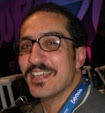The Gap
It's been six months since the catastrophic tsunami in SE Asia. Here in Britain, the media is taking this point in time as an opportunity to assess what's been done with the millions in cash raised in aid of the survivors of the disaster.
This morning's report from the BBC shocked me, even if it did not exactly come as a surprise. A survey by UK-based charity Oxfam reveals that the poorest victims have benefited the least from the massive relief effort. They've found that aid has tended to go to businesses and landowners.
I expressed my doubts about the efficacy of simply donating money way back in January. It seems that my sense of helplessness, or rather the sense that donating money is not enough, was not unfounded.
I have great respect for Oxfam. They are the people who revealed that the precious white bands that are expected to make poverty history have been produced by labour exploitation in China. They are not armchair critics. They are still quite active in the Make Poverty History campaign, of course. They're also involved in other campaigns too, ranging from the Sudan crisis (yes, that's still on!) and helping women in Brazil's Conceição das Crioulas to develop craft products and market them. Income from crafts supports not only their culture, but also their agricultural livelihood and their struggle to reclaim their stolen ancestral farmland.
Oxfam continues to help more than one million people since the tsunami and has raised more than US$250 million to support its aid effort, which is the largest in the organization's history, according to the same report quoted by the BBC this morning revealing the intolerable gaps in aid.
It seems that it takes more than money or politicians to resolve poverty and economic hardship. Unfortunately, money is not easy to administer, and many politicians can hardly manage their own countries' best interests, let alone someone else's. It's so complex. It's so sad.
UPDATE [less than 24 hours after original post] The Girl in the Café, a movie made for TV by director David Yates and screenwriter Richard Curtis, was shown BBC One on Saturday evening. A beautiful love story, not so much about a romance between a mana and a woman, but more so about the scar of poverty on humanity. It hits the nail on the head about the urgency to support Make Poverty History. It's not very comforting to think that "war president" Bush, media manipulator Berlusconi and "lame duck" Chirac are among the 8 men around the G8 table. At least Blair and Brown can ride on the Geldof factor; not to mention Brown's own (positive) political ambitions. We'll see how it goes. It doesn't look too good, but stranger things have happened.
I must read Jeffrey Sachs The End of Poverty.


















And what about the money collected here in Malta on L-Istrina? Has it reached its intended recipients?
That's an excellent question Kenneth!
Post a Comment
<< Home